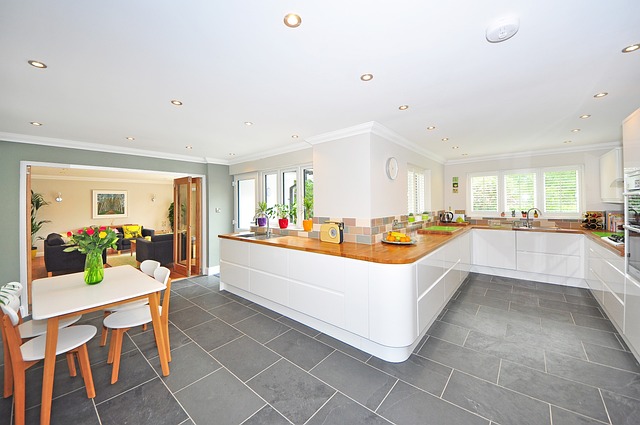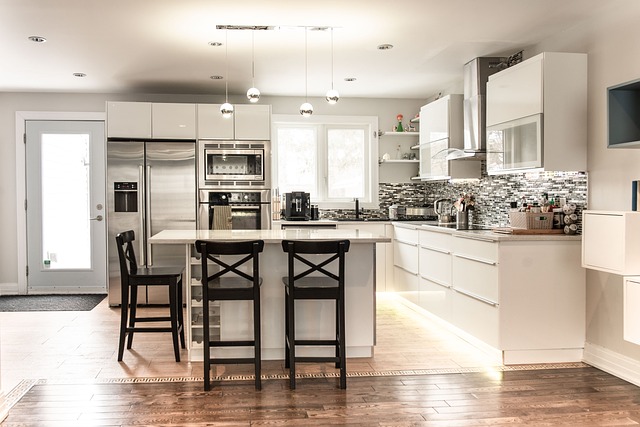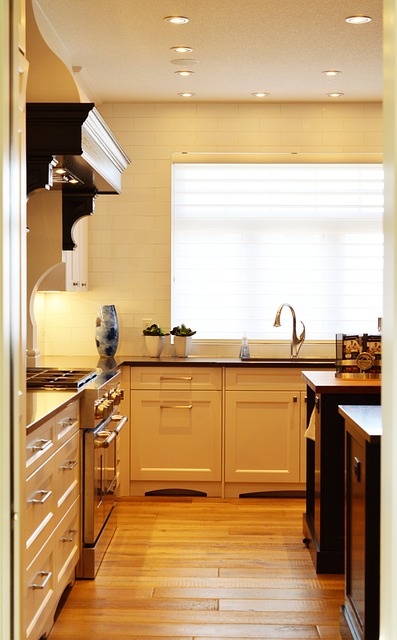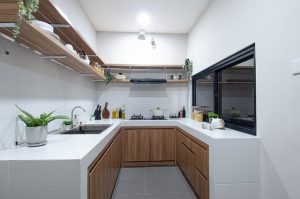Kitchen renovations should focus on efficient layouts to enhance both functionality and aesthetics, avoiding common issues like an ineffective work triangle. Prioritizing storage solutions, appliance placement, and ample counter space, along with adequate movement room, will create a kitchen that is not only visually appealing but also highly operational. Effective lighting for task performance and ambiance should also be a priority. To ensure a successful renovation within budget, thorough financial planning is crucial, including research, budgeting for materials, appliances, labor, permits, and a contingency fund for unexpected costs. Opting for durable and stylish materials like quartz or granite countertops, hardwood or moisture-resistant cabinets, and timeless designs in hardware and fixtures will future-proof your investment, ensuring long-term appeal and functionality. Additionally, adherence to local building codes and regulations is non-negotiable to prevent delays, ensure safety, and maintain market value for your renovated kitchen space. Engaging with a licensed contractor or architect early in the process can provide valuable guidance on compliance issues and help navigate any regulatory hurdles smoothly.
Embarking on a kitchen renovation can transform your culinary space into a functional haven or an aesthetic masterpiece, yet missteps can mar the outcome. To ensure your kitchen transformation is a resounding success, this article delves into common pitfalls and provides strategies to sidestep them. From grasping the nuances of efficient layouts to accurately budgeting for your project, selecting materials that endure, and adhering to local regulations, understanding these aspects is crucial for a kitchen renovation that stands the test of time. Kitchen Renovations can be a rewarding endeavor when approached with insight and foresight, turning your vision into a reality that combines both form and function.
- Understanding the Fundamentals of Efficient Kitchen Layouts
- Budgeting Accurately for Your Kitchen Renovation Project
- Selecting Durable and Timeless Materials for Long-Term Success
- Navigating Regulations and Ensuring Compliance in Kitchen Remodels
Understanding the Fundamentals of Efficient Kitchen Layouts

When embarking on kitchen renovations, a key factor for success is understanding the fundamentals of efficient kitchen layouts. A well-designed layout not only enhances the aesthetic appeal but also promotes a functional cooking environment. Common mistakes to avoid include neglecting the work triangle—the path between the refrigerator, stove, and sink, which should be optimized for seamless movement. Additionally, failing to consider storage space and the proper placement of appliances can lead to clutter and inefficiency. Proper lighting is often an afterthought; however, it’s crucial for task performance and ambiance. Incorporating ample counter space and ensuring there’s enough room for people to move around are also critical. During renovations, it’s easy to get caught up in the visual elements and overlook these practical aspects. However, by prioritizing a layout that supports the flow of cooking, cleaning, and storage activities, homeowners can create a kitchen space that is both beautiful and highly functional. Kitchen renovations that successfully integrate these principles not only elevate the overall value of the home but also make daily tasks more enjoyable and less cumbersome.
Budgeting Accurately for Your Kitchen Renovation Project

When embarking on a kitchen renovation, budgeting accurately is a cornerstone of success. Homeowners often underestimate the costs involved, leading to financial strain or compromises in quality. To avoid such pitfalls, it’s crucial to conduct thorough research and account for potential hidden expenses. A well-planned budget should include not just the cost of materials and appliances but also labor, permits, and a contingency fund to cover unexpected costs. Kitchen renovations can quickly escalate in price, so it’s imperative to have a realistic financial plan that reflects the scope of your project. Additionally, prioritize your spending based on where you’ll see the most return on investment; for instance, investing in energy-efficient appliances not only adds value but also reduces long-term utility costs. By allocating funds judiciously and planning for the unexpected, your kitchen renovation can proceed without financial hiccups, resulting in a space that is both functional and aesthetically pleasing within your set budget constraints.
Selecting Durable and Timeless Materials for Long-Term Success

When embarking on kitchen renovations, selecting durable and timeless materials is paramount for long-term success. Opting for robust countertops that can withstand daily use will prevent the need for frequent replacements. Quartz and granite are excellent choices due to their scratch, heat, and stain resistance, ensuring they maintain their appeal over time. Similarly, high-quality cabinets constructed from sturdy woods like oak or maple, or even moisture-resistant materials such as MDF with a durable finish, will endure the test of time. These materials not only offer longevity but also add to the kitchen’s aesthetic value, complementing various design styles and trends that may evolve over the years.
Avoid the pitfall of chasing fleeting design fads when selecting fixtures and finishes for your kitchen renovations. The allure of contemporary designs can be tempting; however, their relevance may wane as tastes shift. Instead, choose classic designs for elements like hardware, sinks, and lighting that maintain a sense of timelessness. This approach ensures your kitchen remains stylish and functional, regardless of the changing design landscape. Investing in materials and finishes with a proven track record of durability and appeal will future-proof your kitchen, ensuring it remains a centerpiece of your home for years to come.
Navigating Regulations and Ensuring Compliance in Kitchen Remodels

When embarking on kitchen renovations, adherence to local building codes and regulations is paramount to ensure compliance and avoid costly setbacks. Homeowners must first understand the zoning laws and obtain the necessary permits before commencing any construction or remodeling work. This due diligence not only prevents legal complications but also guarantees that safety standards are met, particularly concerning electrical systems, gas lines, and plumbing. Consulting with a licensed contractor or architect can provide clarity on these requirements and help navigate the complexities of regulations specific to kitchen renovations. Their expertise ensures that all renovation work is up to code, which is crucial for both the safety of your home and its future resale value. Additionally, engaging with local building departments early in the planning process allows for a smoother renovation timeline, as any issues can be addressed before construction begins, saving time and resources in the long run. Understanding and adhering to these regulations not only safeguards your investment but also contributes to a kitchen that is both functional and up to the highest safety standards.
when embarking on a kitchen renovation, careful planning and informed decision-making are paramount for achieving a successful outcome. By understanding efficient kitchen layouts, budgeting accurately, selecting durable and timeless materials, and navigating necessary regulations, homeowners can avoid common pitfalls and create a space that not only enhances their daily life but also stands the test of time. Remember, a well-planned kitchen renovation is an investment in both your home’s functionality and its value. Kitchen Renovations require thoughtful consideration at every stage to ensure the end result is both beautiful and practical, serving as the heart of your home for years to come.
